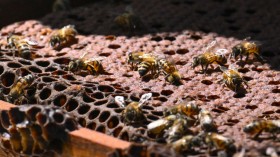In an update to today's news that the UN is bringing pressure on Australia to keep their promise to end dumping at the Great Barrier Reef, scientists at the University of Texas, Australian Institute of Marine Science, and Oregon State University have found that some coral populations have genetic variants for surviving warm ocean waters, and humans can help to spread those genes, according to a release.
In other words, perhaps careful, scientific splicing and dicing will help corals better tolerate climate change. The findings are published this week in the journal Science.
In that promised connection with the Great Barrier Reef, researchers crossed corals from the warmer waters of that vast Australian reef with corals from a cooler latitude about 300 miles to the south. They found that coral larvae with northern parents, where waters were about 35 degree Fahrenheit warmer, were perhaps 10 times as likely to survive heat stress, compared with those with parents from the cooler and more southerly waters, according to a release.
The researchers used genomic tools to identify the biological processes responsible for heat tolerance, demonstrating that heat tolerance could evolve quickly, based on existing genetics, according to the release.
Coral reefs have been considerably damaged by rising sea surface temperatures. Warming water has been linked to bleaching of coral, which can cause coral death. But some corals have higher tolerance for elevated temperatures.
"This discovery adds to our understanding of the potential for coral to cope with hotter oceans," said Line Bay, an evolutionary ecologist with the Australian Institute of Marine Science in Townsville, according to the University of Texas release.
Because the corals in the northern Pacific and Caribbean are similar to those in the study, the reefs there may benefit from conservation and restoration efforts, as well, the release said.
Follow Catherine at @TreesWhales
© 2024 NatureWorldNews.com All rights reserved. Do not reproduce without permission.





